CLASSICAL GERMAN PHILOSOPHY (PART II) Lecture # 11

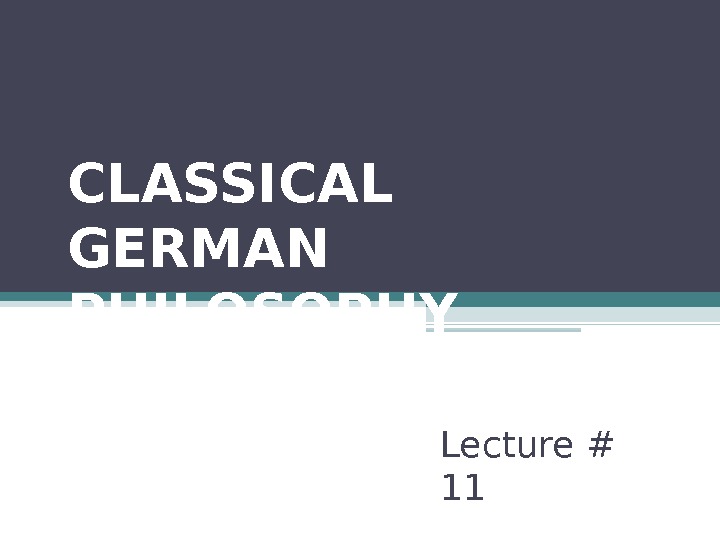
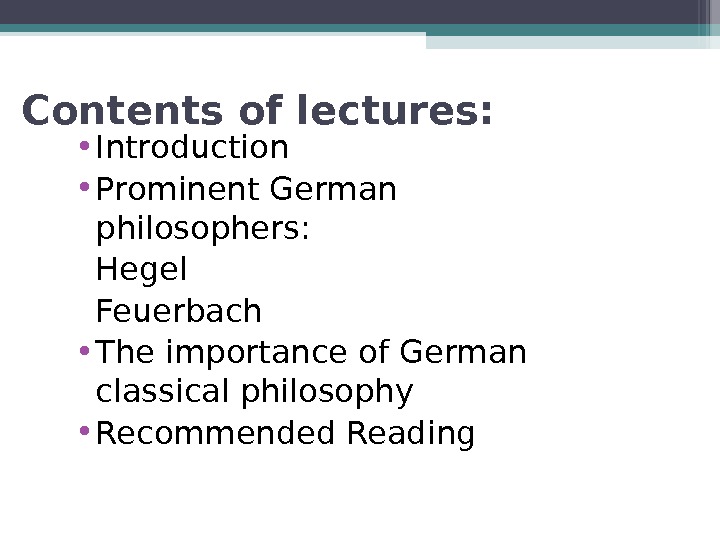
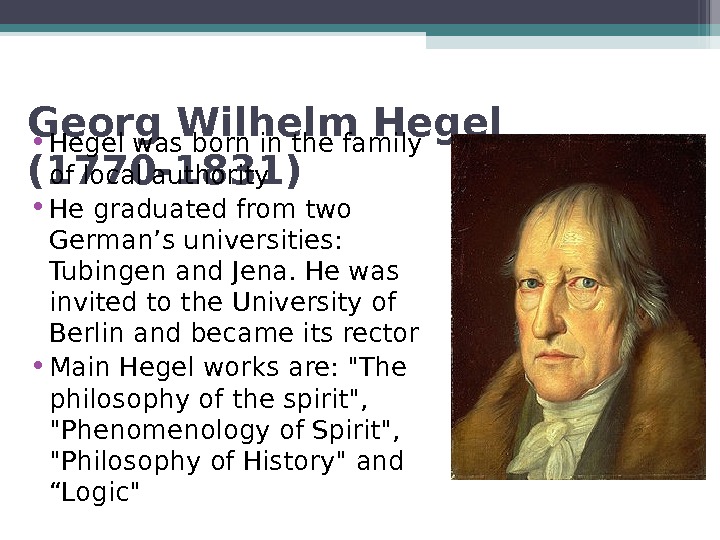
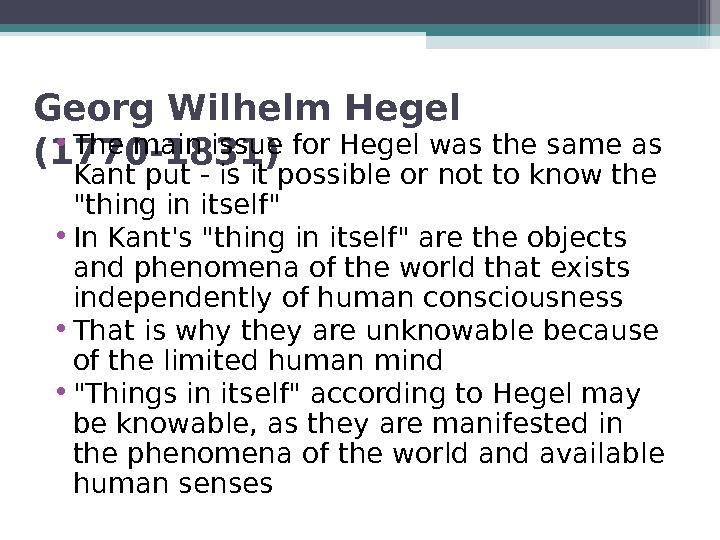
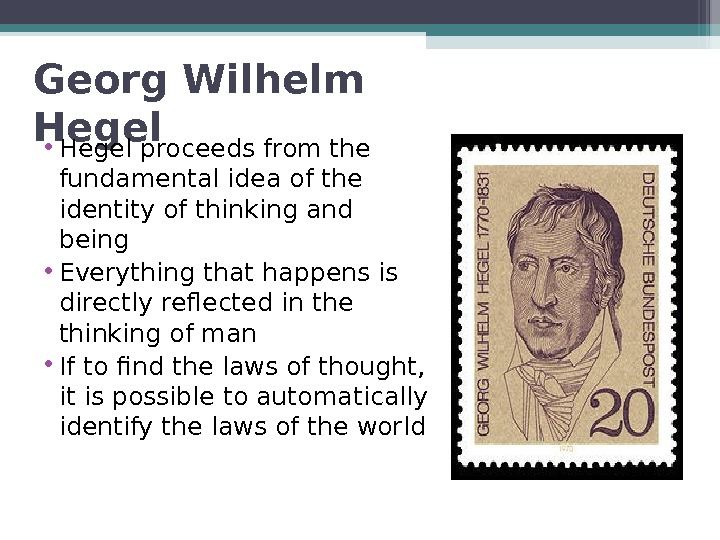
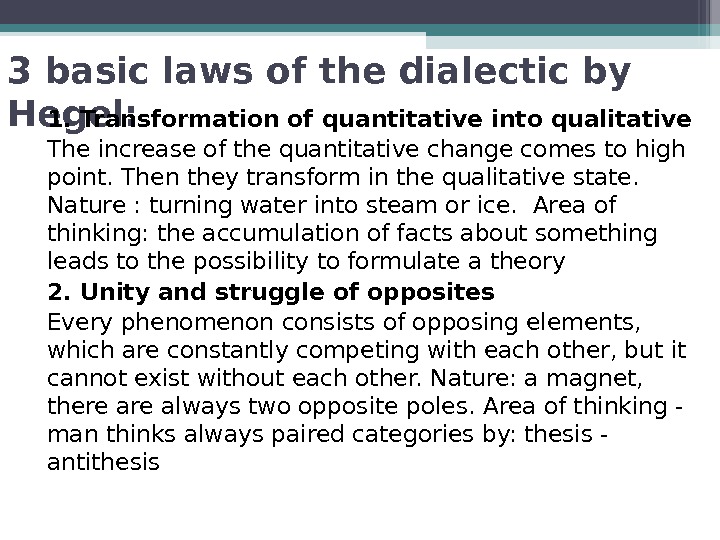
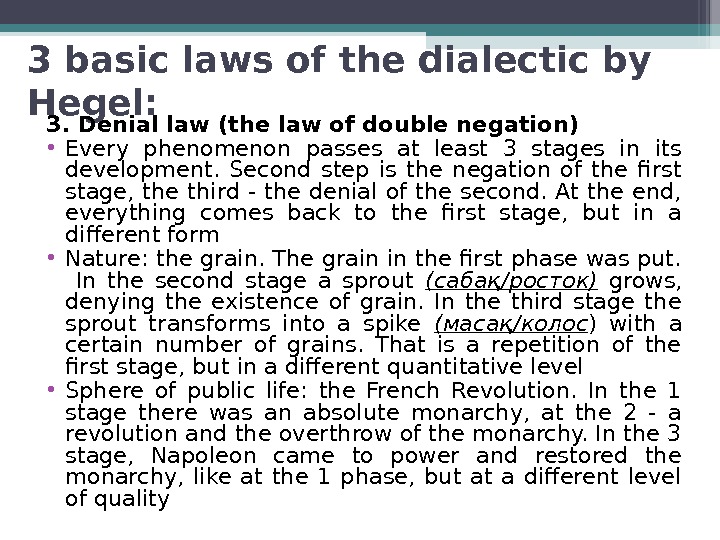
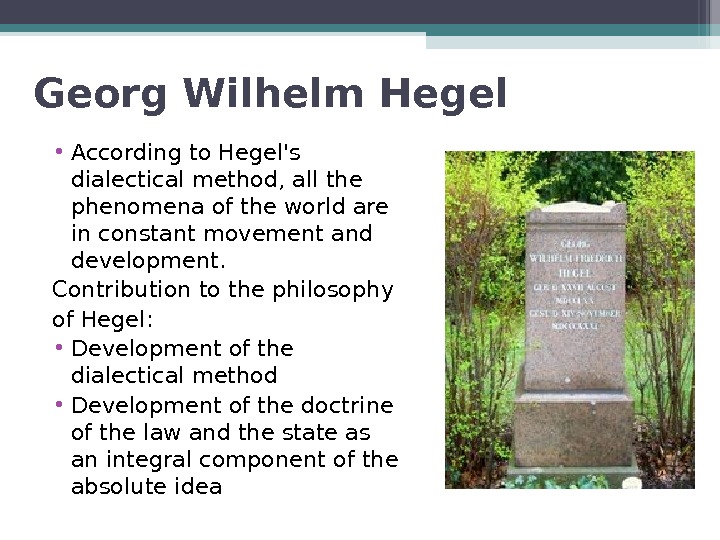
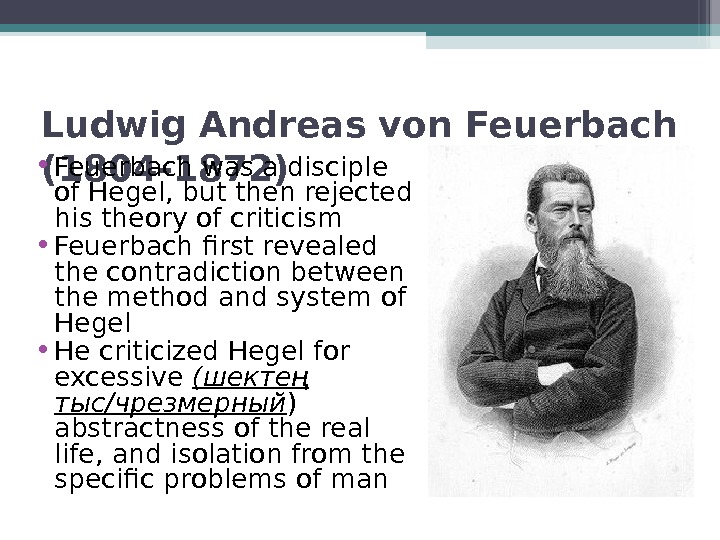
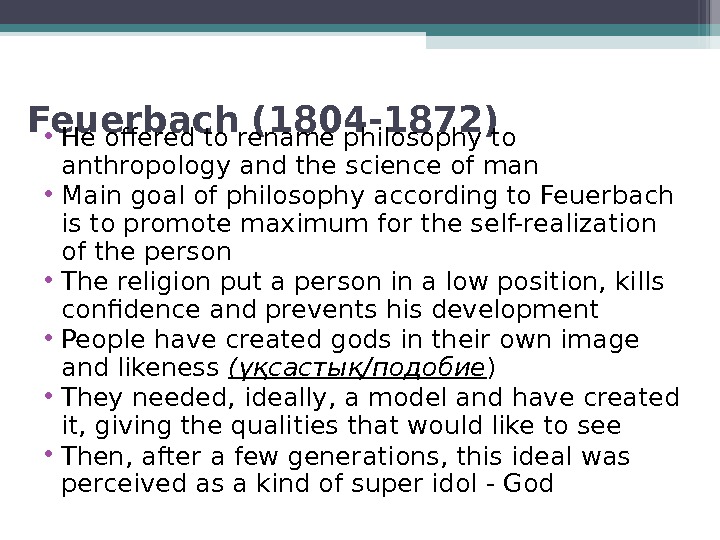
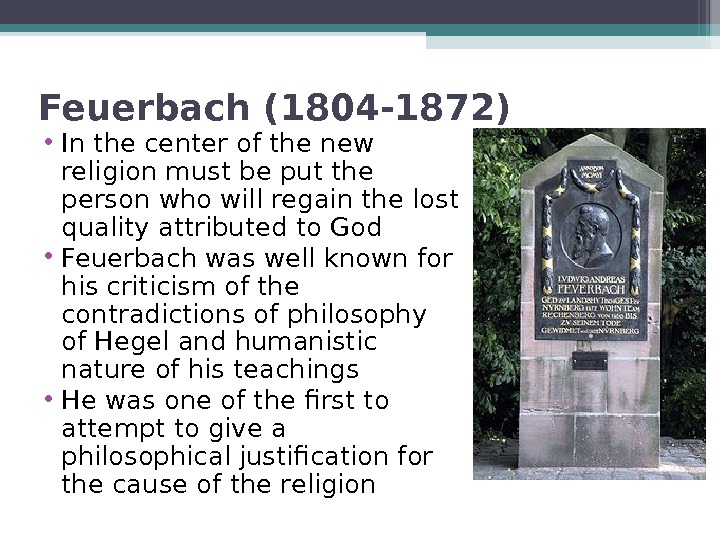
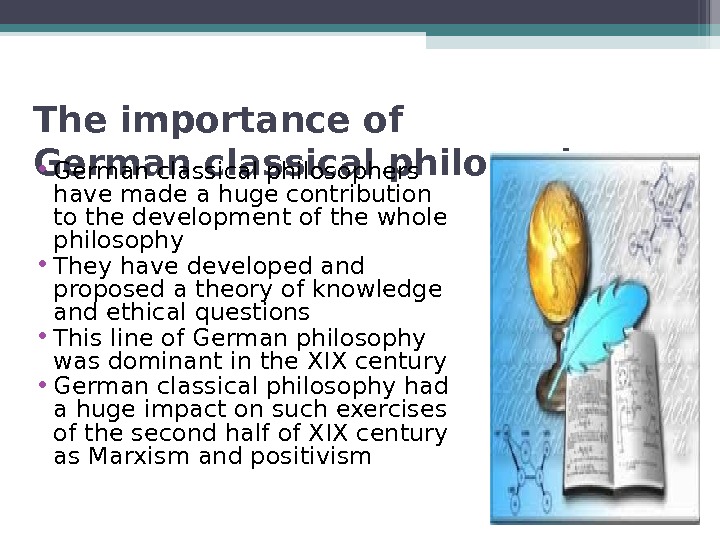
phil-pp-l-_11.german_classic-2.ppt
- Размер: 590.5 Кб
- Количество слайдов: 12
Описание презентации CLASSICAL GERMAN PHILOSOPHY (PART II) Lecture # 11 по слайдам
 CLASSICAL GERMAN PHILOSOPHY (PART II) Lecture #
CLASSICAL GERMAN PHILOSOPHY (PART II) Lecture #
 Contents of lectures: • Introduction • Prominent German philosophers: Hegel Feuerbach • The importance of German classical philosophy • Recommended Reading
Contents of lectures: • Introduction • Prominent German philosophers: Hegel Feuerbach • The importance of German classical philosophy • Recommended Reading
 Georg Wilhelm Hegel (1770 -1831) • Hegel was born in the family of local authority • He graduated from two German’s universities: Tubingen and Jena. He was invited to the University of Berlin and became its rector • Main Hegel works are: «The philosophy of the spirit», «Phenomenology of Spirit», «Philosophy of History» and “Logic»
Georg Wilhelm Hegel (1770 -1831) • Hegel was born in the family of local authority • He graduated from two German’s universities: Tubingen and Jena. He was invited to the University of Berlin and became its rector • Main Hegel works are: «The philosophy of the spirit», «Phenomenology of Spirit», «Philosophy of History» and “Logic»
 Georg Wilhelm Hegel (1770 -1831) • The main issue for Hegel was the same as Kant put — is it possible or not to know the «thing in itself» • In Kant’s «thing in itself» are the objects and phenomena of the world that exists independently of human consciousness • That is why they are unknowable because of the limited human mind • «Things in itself» according to Hegel may be knowable, as they are manifested in the phenomena of the world and available human senses
Georg Wilhelm Hegel (1770 -1831) • The main issue for Hegel was the same as Kant put — is it possible or not to know the «thing in itself» • In Kant’s «thing in itself» are the objects and phenomena of the world that exists independently of human consciousness • That is why they are unknowable because of the limited human mind • «Things in itself» according to Hegel may be knowable, as they are manifested in the phenomena of the world and available human senses
 Georg Wilhelm Hegel • Hegel proceeds from the fundamental idea of the identity of thinking and being • Everything that happens is directly reflected in the thinking of man • If to find the laws of thought, it is possible to automatically identify the laws of the world
Georg Wilhelm Hegel • Hegel proceeds from the fundamental idea of the identity of thinking and being • Everything that happens is directly reflected in the thinking of man • If to find the laws of thought, it is possible to automatically identify the laws of the world
 3 basic laws of the dialectic by Hegel: 1. Transformation of quantitative into qualitative The increase of the quantitative change comes to high point. Then they transform in the qualitative state. Nature : turning water into steam or ice. Area of thinking: the accumulation of facts about something leads to the possibility to formulate a theory 2. Unity and struggle of opposites Every phenomenon consists of opposing elements, which are constantly competing with each other, but it cannot exist without each other. Nature: a magnet, there always two opposite poles. Area of thinking — man thinks always paired categories by: thesis — antithesis
3 basic laws of the dialectic by Hegel: 1. Transformation of quantitative into qualitative The increase of the quantitative change comes to high point. Then they transform in the qualitative state. Nature : turning water into steam or ice. Area of thinking: the accumulation of facts about something leads to the possibility to formulate a theory 2. Unity and struggle of opposites Every phenomenon consists of opposing elements, which are constantly competing with each other, but it cannot exist without each other. Nature: a magnet, there always two opposite poles. Area of thinking — man thinks always paired categories by: thesis — antithesis
 3 basic laws of the dialectic by Hegel: 3. Denial law (the law of double negation) • Every phenomenon passes at least 3 stages in its development. Second step is the negation of the first stage, the third — the denial of the second. At the end, everything comes back to the first stage, but in a different form • Nature: the grain. The grain in the first phase was put. In the second stage a sprout ( сабақ / росток ) grows, denying the existence of grain. In the third stage the sprout transforms into a spike ( масақ / колос ) with a certain number of grains. That is a repetition of the first stage, but in a different quantitative level • Sphere of public life: the French Revolution. In the 1 stage there was an absolute monarchy, at the 2 — a revolution and the overthrow of the monarchy. In the 3 stage, Napoleon came to power and restored the monarchy, like at the 1 phase, but at a different level of quality
3 basic laws of the dialectic by Hegel: 3. Denial law (the law of double negation) • Every phenomenon passes at least 3 stages in its development. Second step is the negation of the first stage, the third — the denial of the second. At the end, everything comes back to the first stage, but in a different form • Nature: the grain. The grain in the first phase was put. In the second stage a sprout ( сабақ / росток ) grows, denying the existence of grain. In the third stage the sprout transforms into a spike ( масақ / колос ) with a certain number of grains. That is a repetition of the first stage, but in a different quantitative level • Sphere of public life: the French Revolution. In the 1 stage there was an absolute monarchy, at the 2 — a revolution and the overthrow of the monarchy. In the 3 stage, Napoleon came to power and restored the monarchy, like at the 1 phase, but at a different level of quality
 Georg Wilhelm Hegel • According to Hegel’s dialectical method, all the phenomena of the world are in constant movement and development. Contribution to the philosophy of Hegel: • Development of the dialectical method • Development of the doctrine of the law and the state as an integral component of the absolute idea
Georg Wilhelm Hegel • According to Hegel’s dialectical method, all the phenomena of the world are in constant movement and development. Contribution to the philosophy of Hegel: • Development of the dialectical method • Development of the doctrine of the law and the state as an integral component of the absolute idea
 Ludwig Andreas von Feuerbach (1804 -1872) • Feuerbach was a disciple of Hegel, but then rejected his theory of criticism • Feuerbach first revealed the contradiction between the method and system of Hegel • He criticized Hegel for excessive ( шектең тыс / чрезмерный ) abstractness of the real life, and isolation from the specific problems of man
Ludwig Andreas von Feuerbach (1804 -1872) • Feuerbach was a disciple of Hegel, but then rejected his theory of criticism • Feuerbach first revealed the contradiction between the method and system of Hegel • He criticized Hegel for excessive ( шектең тыс / чрезмерный ) abstractness of the real life, and isolation from the specific problems of man
 Feuerbach (1804 -1872) • He offered to rename philosophy to anthropology and the science of man • Main goal of philosophy according to Feuerbach is to promote maximum for the self-realization of the person • The religion put a person in a low position, kills confidence and prevents his development • People have created gods in their own image and likeness ( ұқсастық / подобие ) • They needed, ideally, a model and have created it, giving the qualities that would like to see • Then, after a few generations, this ideal was perceived as a kind of super idol — God
Feuerbach (1804 -1872) • He offered to rename philosophy to anthropology and the science of man • Main goal of philosophy according to Feuerbach is to promote maximum for the self-realization of the person • The religion put a person in a low position, kills confidence and prevents his development • People have created gods in their own image and likeness ( ұқсастық / подобие ) • They needed, ideally, a model and have created it, giving the qualities that would like to see • Then, after a few generations, this ideal was perceived as a kind of super idol — God
 Feuerbach (1804 -1872) • In the center of the new religion must be put the person who will regain the lost quality attributed to God • Feuerbach was well known for his criticism of the contradictions of philosophy of Hegel and humanistic nature of his teachings • He was one of the first to attempt to give a philosophical justification for the cause of the religion
Feuerbach (1804 -1872) • In the center of the new religion must be put the person who will regain the lost quality attributed to God • Feuerbach was well known for his criticism of the contradictions of philosophy of Hegel and humanistic nature of his teachings • He was one of the first to attempt to give a philosophical justification for the cause of the religion
 The importance of German classical philosophy • German classical philosophers have made a huge contribution to the development of the whole philosophy • They have developed and proposed a theory of knowledge and ethical questions • This line of German philosophy was dominant in the XIX century • German classical philosophy had a huge impact on such exercises of the second half of XIX century as Marxism and positivism
The importance of German classical philosophy • German classical philosophers have made a huge contribution to the development of the whole philosophy • They have developed and proposed a theory of knowledge and ethical questions • This line of German philosophy was dominant in the XIX century • German classical philosophy had a huge impact on such exercises of the second half of XIX century as Marxism and positivism

